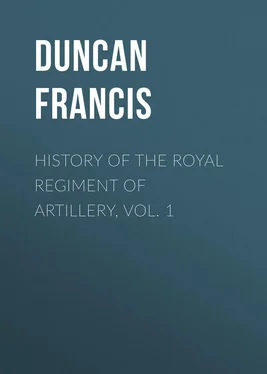Francis Duncan - History of the Royal Regiment of Artillery, Vol. 1
Здесь есть возможность читать онлайн «Francis Duncan - History of the Royal Regiment of Artillery, Vol. 1» — ознакомительный отрывок электронной книги совершенно бесплатно, а после прочтения отрывка купить полную версию. В некоторых случаях можно слушать аудио, скачать через торрент в формате fb2 и присутствует краткое содержание. Жанр: foreign_antique, foreign_prose, на английском языке. Описание произведения, (предисловие) а так же отзывы посетителей доступны на портале библиотеки ЛибКат.
- Название:History of the Royal Regiment of Artillery, Vol. 1
- Автор:
- Жанр:
- Год:неизвестен
- ISBN:нет данных
- Рейтинг книги:4 / 5. Голосов: 1
-
Избранное:Добавить в избранное
- Отзывы:
-
Ваша оценка:
- 80
- 1
- 2
- 3
- 4
- 5
History of the Royal Regiment of Artillery, Vol. 1: краткое содержание, описание и аннотация
Предлагаем к чтению аннотацию, описание, краткое содержание или предисловие (зависит от того, что написал сам автор книги «History of the Royal Regiment of Artillery, Vol. 1»). Если вы не нашли необходимую информацию о книге — напишите в комментариях, мы постараемся отыскать её.
History of the Royal Regiment of Artillery, Vol. 1 — читать онлайн ознакомительный отрывок
Ниже представлен текст книги, разбитый по страницам. Система сохранения места последней прочитанной страницы, позволяет с удобством читать онлайн бесплатно книгу «History of the Royal Regiment of Artillery, Vol. 1», без необходимости каждый раз заново искать на чём Вы остановились. Поставьте закладку, и сможете в любой момент перейти на страницу, на которой закончили чтение.
Интервал:
Закладка:
This officialism was often rampant in the Ordnance; nor with the extinction of that Honourable Board can it be said to have vanished from England's administration.
As in the history of every corporation, there were at the Ordnance fits of economy and extravagance. The extravagance always began at the Tower, the centre of the Board's official centre and kingdom; the economy away at the circumference, among poor gunners at distant stations, among decaying barracks and fortifications crying out loudly for repair. It seems destined to be the motto of departments in every age, "Charity begins at home: economy abroad." After the peace of Utrecht, there was a determined resolution on the part of the Government to retrench, – a wise and praiseworthy resolution, if the method to be adopted were judicious. The Treasury communicated with the Ordnance: and the Tower having made plausible promises to Whitehall, the Honourable Board met to see what could be done. Starting with the official postulate, so characteristic of English departments, that their own salaries were to be untouched, the field of their labour was in proportion contracted. Ultimately they decided to economize in Scotland: they reduced all the stores there; voted no money for the repair of the fortifications or barracks; and, regardless of past services, they reduced the gunners in various garrisons.
From the far north a plaintive appeal meets the student's eye. It is from one John Murray, who had been Master-Gunner of Fort William for nineteen years, and who in this fit of economy had been ruthlessly struck off the establishment. Verily, ere many months be over, honest John shall have his revenge!
From Scotland, the Board turned to the Colonies, and reminded them that they must pay for their own engineers and gunners, if they wished to keep them. A committee sat to inquire how the American dependencies could be made to pay for themselves, – the beginning of that official irritation which culminated in the blaze in which we lost them altogether; and in the mean time demands for stores were neglected. One unhappy Governor wrote that he had under his command a company of troops which for fifteen years had received no fresh bedding: and "many of the soldiers were very ill, and in y ewinter ready to starve." A special messenger was sent to lay the matter before the Board; but, he having been recalled by domestic reasons before succeeding in his prayer, the Board adroitly pigeon-holed his petition for four years; and, in the language of a subsequent letter, "For want of bedding, many of y esoldiers have since perished."
But ere long came the inevitable swing in the other direction. Queen Anne died; King George had not yet landed at Greenwich; there was agitation and conspiracy among the adherents of the Stuarts, and Scotland was simmering with rebellion. Then did the fearful Privy Council send letter after letter to the Ordnance urging them to find arms for 10,000 men for Scotland, or for 5000, or even for 4000; but from their diminished stores even this small body could with difficulty be armed. A train of artillery was ordered to march, and could not: everything was starved, and in chaos; and its commander, Albert Borgard, wrote, "Things are in such confusion as cannot be described." Orders were sent to man and defend Fort William, the now desolate scene of John Murray's nineteen years; and General Maitland, on reaching it, reported that "the parapets want repairing: there are no palisadoes; without an engineer to help me, I can but make the best of a bad bargain." He had to advance the money himself: "Who pays me," he wrote, "I know not." By next messenger he asked for a little gunpowder, a few spades, pickaxes, and wheelbarrows, all rather useful articles in a fortification, but which had vanished under the breath of economy. There were no gunners, he wrote, to work the guns; and he requested that the hand-grenades which were coming from Edinburgh might be filled and fitted with fuzes before they should be sent to him, "for we have none here that understand this matter well." Of a truth, John Murray had his revenge!
The principal gate of the fortress was so rotten and shattered that it could not be made use of, and was of no defence at all. There never had been any gate, the General wrote, to the port of the ravelin; and unless the platform could be renewed, it would be impossible to work the guns. "And," he adds in a well-rounded period, "the old timber houses in which the officers of the Garrison are lodged, and also the old timber chapell, are all in such a shattered pitifull condition, that neither the first can be lodged in one, nor the Garrison attend divine service in the other without being exposed to the inconvenience of all weathers."
Nor was General Maitland singular. From Dumbarton Castle Lord Glencairn wrote to the Board, "We not only want in a manner everything, but we have not so much as a boat. And, besides, the Garrison wants near four months' pay." From Carlisle the Governor wrote that there were only four barrels of powder in the garrison, a deficiency of every species of stores, and only four gunners, "three of which are superannuated." Most of the gun-carriages were unserviceable, and the platforms wanted repairing. There was haste and panic at Portsmouth, as empty stores and unarmed ships warned the Board what work there was before them. And from Chester, Mr. Asheton, the zealous governor just appointed, reported, "The guns are all here, but not the carriages, so that the stores, &c., would be of service – not prejudice – to an enemy." The only men there who were capable of doing any work were forty invalids ; and he therefore begged for assistance in men and stores, "in order" he wrote, "that I may be capable of doing my country service by maintaining the rights of our gracious Sovereign King George against all Popish Pretenders whatsoever."
As the guns of the Tower blazed out their welcome to the King, the smoke must have clouded over such an accumulation of testimony in the Ordnance offices hard by, proving that there may be an economy which is no economy at all, as might almost have penetrated the intelligence of a Board. This period in the history of the Ordnance is unsurpassed, even by the many blundering times which, in the course of these volumes, we shall have to examine, down to that day in the year of grace 1855 when, "from the first Cabinet at which Lord Palmerston ever sat as Premier, the Secretary at War brought home half a sheet of paper, containing a memorandum that the Ordnance – one of the oldest Constitutional departments of the Monarchy … was to be abolished." 1 1 Clode.
In the early days of the Ordnance Board, its relations with the navy were more intimate than in later years. The gunners of the ships were under its control, and had to answer to it for the expenditure of their stores. In this particular, as in most details of checking and audit, the Board was stern to a degree, and not unfrequently unreasonable. In 1712, the captain of a man-of-war, sent to Newfoundland in charge of a convoy, found the English inhabitants of the Island in a state of great danger and uneasiness, and almost unprotected. At their urgent request, he left with them much of his ordnance and stores before he returned to England. With the promptitude which characterized the Board's action towards any one who dared to think for himself, it refused to pass the captain's or gunner's accounts, nor would it authorize them to draw their pay. Remonstrance was useless; explanations were unattended to: the lesson had to be taught to its subordinates, however harshly and idiotically, that freewill did not belong to them, and that to assume any responsibility was to commit a grievous sin. It actually required a petition to the Queen and the Treasury before the unhappy men could get a hearing, and, as a natural consequence, an approval and confirmation of their conduct.
Читать дальшеИнтервал:
Закладка:
Похожие книги на «History of the Royal Regiment of Artillery, Vol. 1»
Представляем Вашему вниманию похожие книги на «History of the Royal Regiment of Artillery, Vol. 1» списком для выбора. Мы отобрали схожую по названию и смыслу литературу в надежде предоставить читателям больше вариантов отыскать новые, интересные, ещё непрочитанные произведения.
Обсуждение, отзывы о книге «History of the Royal Regiment of Artillery, Vol. 1» и просто собственные мнения читателей. Оставьте ваши комментарии, напишите, что Вы думаете о произведении, его смысле или главных героях. Укажите что конкретно понравилось, а что нет, и почему Вы так считаете.












